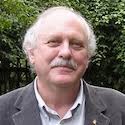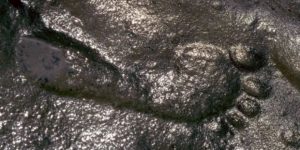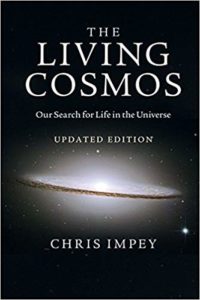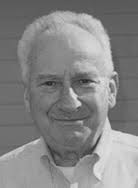Not long ago I was having a conversation with an atheist acquaintance on social media about the origin of the universe and my friend suggested "nobody" believes there was ever a time when literally nothing existed. Naturally, my response was something along the lines of "Oh, really?" and I posted the Amazon link to physicist Lawrence Krauss' book A Universe From Nothing, the title of which would seem to refute his claim. photo by REUTERS/Leah Millis Curiously, he asked if I'd read the book (as if I'm in the habit of recommending books I didn't write nor haven't read). I didn't bother explaining that I'd first read the book approximately six years ago and had written a review published as the Atlanta Creationism Examiner for the now-defunct Examiner.com website. I briefly entertained the idea of simply republishing the original article here at my website, but that review seemed dated, so I decided not to re-post it. Then, out of the blue, another atheist acquaintance in yet another "discussion" forum posted the link to another six-year-old review of Krauss' book by David Albert, returning it to the forefront of my mind. Which brings us here. Technically speaking, my atheist friend's argument had been correct in the sense that physicists and cosmologists have explained prior to the creation of our universe, time did not exist because it had no means to measure it, given that our measurements for time are exclusively defined by the universe. Thomas Aquinas famously suggested that our universe began with time, not in time. God created the universe literally ex … [Read more...]
Calling the wrong guy stupid
Dr. Laurence Moran Laurence A. "Larry" Moran (and no, it's not really Moron) is apparently a pretty smart guy. He holds a PhD in biochemistry from Princeton University and served as a college professor for decades at the University of Toronto. He's probably best known for being one of the lead authors of a textbook called Principles of Biochemistry, although in fairness, his personal blog called Sandwalk also attracts a fair amount of internet traffic, which is how I learned about Dr. Moran--ironically enough, while searching the internet for information on Dr. James Tour. What has inspired me to write about my limited knowledge of Dr. Moran was the conclusion to his article harshly critical of Dr. Tour: I suppose I'm going to be labeled as one of those evil "Darwinists" who won't tolerate anyone who disagrees with me about evolution. I'm actually not. I just don't like stupid people who think they are experts in evolution when they have never bothered to learn about it. Here's my advice to graduate students in organic chemistry: if you want to know about evolution then take a course or read a textbook. And remember, there's nothing wrong with admitting that you don't understand a subject. Just don't assume your own ignorance means that all the experts in the subject are wrong too. [emphasis added]Laurence A. Moran, "A chemist who doesn't understand evolution" Wow. If I'm not mistaken, Dr. Moran just described Dr. Tour as being a stupid person. So I'm wondering, is it possible that a chemistry professor wouldn't know who Dr. Tour is? How could he not know? … [Read more...]
Falsifying evolution
The Zapata footprint According to Karl Popper, the ultimate test of whether a theory was scientific or philosophic was whether or not the theory could be falsified, meaning it could be tested according to the scientific method and theoretically proved to be untrue by solid contradictory evidence. J.B.S. Haldane once joked that the best evidence to disprove Darwinian theory would be a fossilized rabbit in Precambrian rock strata, because rabbits allegedly didn't "evolve" until several hundred million years after the Cambrian extinction event had elapsed. Haldane didn't realize it at the time, but his joke has ultimately shown that Darwinian evolution cannot be falsified. The theory of evolution has become the equivalent of religious dogma that simply cannot be challenged or questioned. Consider the Zapata footprint above. If the print was found on a sandy beach, no one would question for a moment whether it was a genuine footprint created by a human being. However, this particular print was discovered in rock allegedly 250 million years old. Scientific tests should be able to provide a reasonably accurate age for the rock, and additional experiments should be able to demonstrate how the footprint could have been faked, assuming the fossil is not genuine. Likewise, the image below allegedly shows a human footprint and a dinosaur footprint fossilized in the same layer of rock. Perhaps there is some plausible explanation for these fossils, and they only look like human and dinosaur footprints that are neither deliberate frauds, nor what they appear to be. Or … [Read more...]
Thoughts on The Living Cosmos by Chris Impey
Science is a discipline that theists should be able to enjoy and appreciate--after all, theists invented science in their quest to learn about God. Science should not seen as a potential threat to religious belief. Anyone who claims that science somehow eliminates any need for a God simply doesn't understand existential science very well. Over the past decade or so, I've read a number of "popular" books about biology, paleontology, cosmology, Darwin's theory of natural selection (or "evolution") and other related topics in a personal quest for answers to my personal philosophical/existential questions: Who am I? Why am I here? How did I come to exist? When contemplating those questions one must also ask related questions like: How was the universe created? How did life originate? These latter questions are considered scientific by nature. Of the numerous books I've consumed on related subjects, among the very best I've read was a book titled The Living Cosmos written by Chris Impey, an astronomy professor at the University of Arizona. While I disagreed with some of Professor Impey's conclusions, he is without question an extremely talented writer. He mixes in plausible-sounding scenarios that create vivid imagery that convey his secular ideology regarding religion and evolution, whether he's providing a fictionalized account of the martyrdom of Giordano Bruno or one of an asteroid strike causing the K-T extinction, while grazing dinosaurs remained oblivious to their imminent doom. Professor Impey very accurately described the highly improbable cosmological … [Read more...]
Molecular Biologist Franklin Harold’s thoughts on abiogenesis
Described as "one of the world's most respected microbiologists" on the jacket of his hardcover book in our local library, Professor Franklin Harold of Colorado State University has included some fascinating observations In his book The Way of the Cell on the topic of abiogenesis, or the scientific hypothesis about the origin of life. If one cares about the mini-reviews on the back cover, they would seem to lend credibility to his claim of expertise on the subject, given the enthusiastic endorsement of his book by renowned biologist Lynn Margulis. Dr. Harold appears to be imminently qualified to write about the subject in question. In my opinion, his chapter titled "Searching for the beginning" is so remarkable we should start at its beginning. Professor Harold writes, Of all the unsolved mysteries remaining in science, the most consequential may be the origin of life. This opinion is bound to strike many readers as overblown, to put it mildly. Should we not rank the Big Bang, life in the cosmos, and the nature of consciousness on at least an equal plane? My reason for placing the origin of life at the top of the agenda is that resolution of this question is required in order to anchor living organisms securely in the real world of matter and energy, and thus relieve the lingering anxiety as to whether we have read nature's book correctly. Creation myths lie at the heart of all human cultures, and science is no exception; until we know where we come from, we do not know who we are. [emphasis added]"Franklin Harold, The Way of the Cell Many people who argue … [Read more...]





